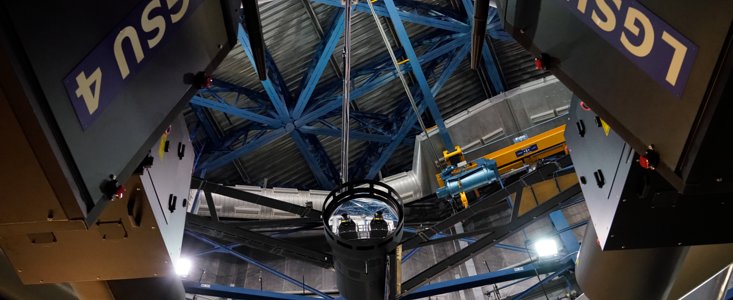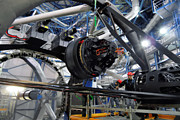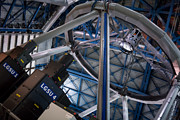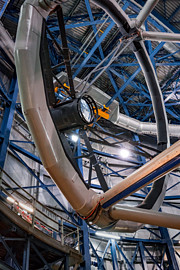Annuncio
Prima luce per il più grande sistema di ottiche adattive
L'UT4 del VLT compie un passo cruciale verso una tecnologia completamente adattiva
28 Ottobre 2016
Un'importante pietra miliare è stata posta nel progetto volto a trasformare l'UT4 (Yepun) del VLT (Very Large Telescope) dell'ESO in un telescopio completamente adattivo, mediante l'installazione di uno specchio secondario deformabile.
I sistemi di ottiche adattive compensano l'effetto di sfocatura dovuto all'atmosfera terrestre, che degrada la nitidezza delle immagini che possono essere ottenute con un telescopio, anche uno molto grande e sofisticato come il VLT. L'installazione della nuova Adaptive Optics Facility (AOF) come parte integrante dell'UT4 consentirà al telescopio di ottenere immagini ancora più nitide.
Lo specchio secondario deformabile è costituito da uno specchio flessibile di spessore pari a 1,96 millimetri, appoggiato su una montatura dotata di 1170 attuatori che cambiano la forma dello specchio per correggere l'effetto di turbolenza nell'atmosfera. Con poco più di un metro di diametro, è il più grande specchio adattivo mai costruito. Lo specchio deformabile ha richiesto una tecnologia all'avanguardia e il suo percorso di sviluppo è iniziato diversi anni fa. La costruzione del'"riferimento per l'ottica" — sostanzialmente, il supporto dello specchio — è stata completata nel 2010 e la prima versione dello stesso specchio sottile è stata consegnata al quartier generale dell'ESO a Garching alla fine del 2011, seguita da una versione migliorata nel 2014. A seguito di estesi test di prestazioni effettuati a Garching, l'insieme dei componenti dello specchio secondario deformabile è stato spedito in Cile e adesso è stato montato sul telescopio Yepun da 8,2 metri di diametro.
L'allineamento ottico e altri test sono stati eseguiti di recente con lo specchio deformabile — posto in modalità rigida — montato sul telescopio e sono stati superati a pieni voti.
Oltre a sostituire il tradizionale specchio secondario del telescopio con questo nuovo specchio deformabile, il sistema AOF comprende anche la Four Laser Guide Star Facility (4LGSF, Sistema a 4 stelle guida laser), che ha visto la prima luce nel mese di aprile 2016, e l'installazione dei moduli di ottica adattiva (AO) nei diversi fuochi dello specchio secondario. I moduli di ottica adattiva sono GRAAL (GRound layer Adaptive optics Assisted by Lasers), che immette immagini corrette all'interno di HAWK-I, e GALACSI (Ground Atmospheric Layer Adaptive Corrector for Spectroscopic Imaging), che pre-filtra le immagini per lo spettrografo MUSE.
Altri strumenti per ottimizzare le operazioni dell'AOF sono stati sviluppati e adesso sono operativi. Questi includono il software Astronomical Site Monitor, che controlla l'atmosfera per determinare a quale altitudine si verifica la turbolenza, e il sistema Laser Traffic Control, che impedisce ai fasci della 4LGSF di interferire con aeroplani in volo o telescopi nello spazio.
Con l'avvento del sistema AOF, il VLT continuerà ad estendere la sua lista di risultati scientifici di punta e l'esperienza con il sistema al Paranal contribuirà a superare le sfide tecniche presentate dal prossimo grande progetto dell'ESO, la costruzione dello European Extremely Large Telescope.
Links
Contatti
Elise Vernet
ESO
Garching bei München, Germany
Tel: +49 89 3200 6322
Email: evernet@eso.org
Robin Arsenault
ESO
Garching bei München, Germany
Tel: +49 89 3200 6524
Email: rarsenau@eso.org
Peter Grimley
ESO, Assistant Public Information Officer
Garching bei München, Germany
Tel: +49 89 3200 6383
Email: pgrimley@eso.org
Riguardo all'annuncio
| Identificazione: | ann16078 |
Our use of Cookies
We use cookies that are essential for accessing our websites and using our services. We also use cookies to analyse, measure and improve our websites’ performance, to enable content sharing via social media and to display media content hosted on third-party platforms.
ESO Cookies Policy
The European Organisation for Astronomical Research in the Southern Hemisphere (ESO) is the pre-eminent intergovernmental science and technology organisation in astronomy. It carries out an ambitious programme focused on the design, construction and operation of powerful ground-based observing facilities for astronomy.
This Cookies Policy is intended to provide clarity by outlining the cookies used on the ESO public websites, their functions, the options you have for controlling them, and the ways you can contact us for additional details.
What are cookies?
Cookies are small pieces of data stored on your device by websites you visit. They serve various purposes, such as remembering login credentials and preferences and enhance your browsing experience.
Categories of cookies we use
Essential cookies (always active): These cookies are strictly necessary for the proper functioning of our website. Without these cookies, the website cannot operate correctly, and certain services, such as logging in or accessing secure areas, may not be available; because they are essential for the website’s operation, they cannot be disabled.
Functional Cookies: These cookies enhance your browsing experience by enabling additional features and personalization, such as remembering your preferences and settings. While not strictly necessary for the website to function, they improve usability and convenience; these cookies are only placed if you provide your consent.
Analytics cookies: These cookies collect information about how visitors interact with our website, such as which pages are visited most often and how users navigate the site. This data helps us improve website performance, optimize content, and enhance the user experience; these cookies are only placed if you provide your consent. We use the following analytics cookies.
Matomo Cookies:
This website uses Matomo (formerly Piwik), an open source software which enables the statistical analysis of website visits. Matomo uses cookies (text files) which are saved on your computer and which allow us to analyze how you use our website. The website user information generated by the cookies will only be saved on the servers of our IT Department. We use this information to analyze www.eso.org visits and to prepare reports on website activities. These data will not be disclosed to third parties.
On behalf of ESO, Matomo will use this information for the purpose of evaluating your use of the website, compiling reports on website activity and providing other services relating to website activity and internet usage.
Matomo cookies settings:
Additional Third-party cookies on ESO websites: some of our pages display content from external providers, e.g. YouTube.
Such third-party services are outside of ESO control and may, at any time, change their terms of service, use of cookies, etc.
YouTube: Some videos on the ESO website are embedded from ESO’s official YouTube channel. We have enabled YouTube’s privacy-enhanced mode, meaning that no cookies are set unless the user actively clicks on the video to play it. Additionally, in this mode, YouTube does not store any personally identifiable cookie data for embedded video playbacks. For more details, please refer to YouTube’s embedding videos information page.
Cookies can also be classified based on the following elements.
Regarding the domain, there are:
- First-party cookies, set by the website you are currently visiting. They are stored by the same domain that you are browsing and are used to enhance your experience on that site;
- Third-party cookies, set by a domain other than the one you are currently visiting.
As for their duration, cookies can be:
- Browser-session cookies, which are deleted when the user closes the browser;
- Stored cookies, which stay on the user's device for a predetermined period of time.
How to manage cookies
Cookie settings: You can modify your cookie choices for the ESO webpages at any time by clicking on the link Cookie settings at the bottom of any page.
In your browser: If you wish to delete cookies or instruct your browser to delete or block cookies by default, please visit the help pages of your browser:
Please be aware that if you delete or decline cookies, certain functionalities of our website may be not be available and your browsing experience may be affected.
You can set most browsers to prevent any cookies being placed on your device, but you may then have to manually adjust some preferences every time you visit a site/page. And some services and functionalities may not work properly at all (e.g. profile logging-in, shop check out).
Updates to the ESO Cookies Policy
The ESO Cookies Policy may be subject to future updates, which will be made available on this page.
Additional information
For any queries related to cookies, please contact: pdprATesoDOTorg.
As ESO public webpages are managed by our Department of Communication, your questions will be dealt with the support of the said Department.





